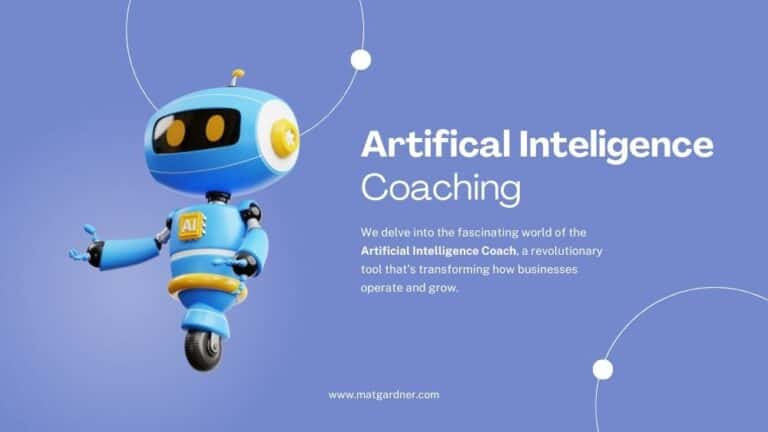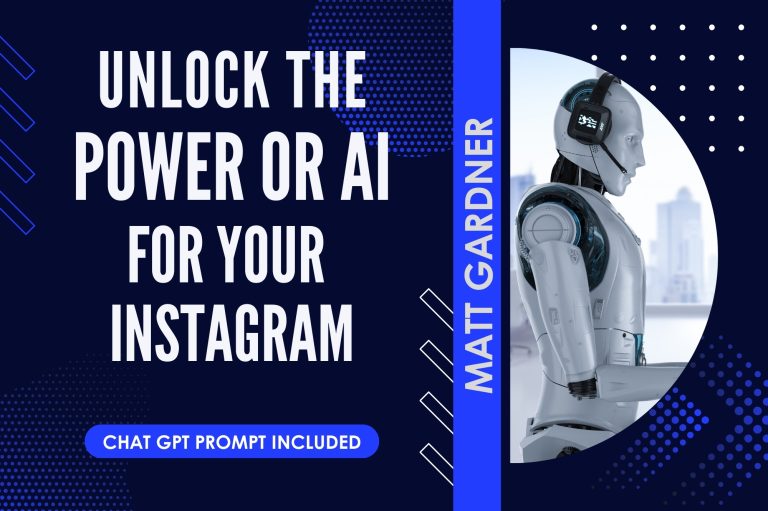Revolutionizing Business: A Guide to AI Leadership Coaching
Today, we’re diving into the transformative world of AI leadership coaching. This innovative approach is revolutionizing how businesses develop their leaders and drive success.
From understanding its benefits to exploring ways to implement it effectively, we’ve got you covered.
You’ll be equipped with knowledge that could change your organization’s leadership landscape within a short time.
In this exciting journey through AI Leadership Coaching, expect an enlightening exploration that will redefine your perception about modern-day business coaching methods.
What is AI Leadership Coaching?
In the world of professional development, a new trend has emerged: AI leadership coaching.
This innovative approach combines artificial intelligence with human expertise to deliver personalized guidance that meets individual needs.
The Blend of Artificial Intelligence and Human Coaching
This hybrid model leverages both technology and human insight in an intriguing way. The primary role of AI here is automating routine tasks, thus freeing up time for coaches to engage more deeply with their clients.
It’s like having your very own chatbot providing AI coaching while still maintaining the personal touch from real-life mentors.
A unique aspect about this process involves giving real-time feedback based on data collected by the AI system during sessions or via other performance metrics sources.
These insights are then shared between coach and coachee for further discussion and action planning – making sure you’re attaining objectives relative to your goals effectively.
Distinguishing Between Human-led And AI-based Coaching
While the allure of replacing traditional methods entirely with cutting-edge tech tools like group coaching institute software platforms may be tempting, it is important to remember one crucial aspect: no tool can fully replicate the genuine human interaction experience.
It’s this human touch that adds a unique and irreplaceable dimension to our interactions. So, while we embrace technology, let’s not forget the value of authentic human connection.
They work best when used together where one opens possibilities; another ensures those opportunities align well with personal values and aspirations.
The synergy between tasks and overall results goes beyond mere completion. It’s about achieving a deeper objective – holistic self-improvement. In today’s rapidly advancing world, where technology evolves daily, this growth remains invaluable.
Data’s Role In The Process
- Efficiency: With its ability to collect vast amounts of information quickly, artificial intelligence makes informed decisions faster than ever before possible when solely relying on manual efforts alone.
- Perspective: Having access to these insights means we’re better equipped to handle future challenges proactively rather than reactively – thereby enhancing our resilience over time too.
- Growth: Benefits extend beyond immediate gains because having access to these insights means we’re better prepared to handle future challenges proactively rather than reactively – thereby improving our resilience over time too.
Key Takeaway:
AI leadership coaching blends tech and human expertise for personalized guidance. AI handles routine tasks, freeing coaches to delve deeper with clients. Real-time feedback from AI data informs discussions and planning, ensuring goals are met effectively. While technology is beneficial, it can’t replace genuine human interaction entirely; the synergy of both leads to holistic self-improvement.
Benefits of AI Leadership Coaching
The fusion of artificial intelligence (AI) and leadership coaching is transforming the way businesses operate. It’s like having a personal assistant that helps streamline operations, but with an added touch of sophistication.
Boosted Efficiency
An undeniable perk offered by AI-based coaching lies in its ability to enhance efficiency. By automating routine tasks such as scheduling sessions or tracking progress, it liberates human coaches from mundane chores, allowing them more time for personalized guidance.
Data-Driven Decision Making
In addition to streamlining processes, another striking feature about AI is its data-crunching prowess.
With the ability to swiftly analyze vast amounts of data, we gain deeper insights into performance metrics, surpassing the limitations of manual analysis.
This paves the way for evidence-based decision making, moving beyond intuition alone. It’s all about making informed choices backed by data!
Prompt Feedback
- Giving Real-Time Feedback: Artificial Intelligence collects real-time data, which means feedback too becomes instantaneous – helping individuals identify their mistakes at once and rectify them without waiting for scheduled reviews.
Sustained Engagement through Chatbots
A fascinating aspect about certain forms of “AI Coaching” is chatbots providing follow-ups between sessions – ensuring continued engagement even when not directly interacting with a coach.
An example would be how these bots send strong messages reminding clients to set professional goals. This keeps motivation levels high throughout their journey towards achieving objectives relative to traditional methods where there may be gaps between interactions.
Broad Accessibility: Sharing Global Coaching made possible.
Lastly, one cannot ignore the immense accessibility advantage brought forth by digital tools like these advanced platforms powered by AI technology.
In today’s connected world, it isn’t just a catchy phrase anymore; thanks largely due to advancements in tech enabling us to access anywhere anytime.
Matt’s Insight:
AI leadership coaching is a game-changer in business, boosting efficiency by automating routine tasks and enabling data-driven decisions. With real-time feedback, sustained engagement via chatbots, and broad accessibility thanks to digital tools, it’s like having a sophisticated personal assistant at your fingertips.
How to Choose an AI Leadership Coach
Finding the perfect AI leadership coach may seem like a daunting task.
But fear not! By taking certain factors into consideration and understanding your unique needs, you can make a more informed decision.
Identify Your Requirements
When it comes to selecting an AI-based coaching system, it’s crucial to start by identifying the key areas of leadership development that require focus.
And hey, don’t forget to think about how artificial intelligence can lend its support to these very goals within your organization!
Evaluate Key Features
An effective AI coaching platform must offer features that align well with your objectives. Seek out systems capable of giving real-time feedback, automating routine tasks, and providing means for setting professional goals; all crucial aspects identified by leading organizations like the International Coaching Federation (ICF).
Data Collection Methods Matter
Different from human coaches’ approach, data collection methods used by artificial intelligence are vital as they provide valuable insights about team performance and individual growth while maintaining robust privacy measures.
Prioritize User Experience
When selecting an AI leadership coach, it’s important to prioritize user experience. Search for a platform that is straightforward, comfortable to use, and offers an effortless connection. This will ensure that both leaders and employees can easily navigate and utilize the coaching system.
The Role of Technology in AI Leadership Coaching
AI leadership coaching is a game-changing approach that harnesses technology to deliver valuable insights, offer immediate feedback, and tailor personalized strategies for self-improvement.
Data Collection through Artificial Intelligence
In the realm of data collection, artificial intelligence proves itself indispensable.
It sifts through performance metrics or communication patterns within an organization to gather valuable information. This forms the foundation for creating tailored coaching programs designed with individual needs at heart.
Trends or behaviors obstructing productivity can be efficiently identified using these data-driven insights from AI coaches. These might include aspects affecting team collaboration as well.
Routine Tasks Automated by AI
Beyond gathering crucial data, another significant role played by AI involves automating routine tasks like scheduling meetings and follow-ups. This not only saves time but also ensures consistency in the coaching process.
As such, automation frees up human coaches’ time, allowing them to focus more on strategic activities rather than administrative chores.
Giving Real-Time Feedback: A Key Advantage
A standout feature of utilizing AI-based coaching lies in its ability to give real-time feedback based on continuous monitoring of employee behavior patterns and performances.
With this immediate response system, employees are motivated towards better performances while any arising issues get addressed promptly before they escalate into bigger problems.
Fostering Communication via Chatbots
This particular form of artificial intelligence software simulates conversation with users over internet platforms, proving effective tools for fostering communication between leaders and their teams.
These chatbots send strong messages, engaging employees regularly, thereby maintaining open lines of communication at all times, even outside formal settings.
Challenges Faced by Organizations Using AI Leadership Coaching
Initiating AI leadership coaching into business operations is quite a journey.
It’s not always smooth sailing, as we encounter roadblocks such as resistance to change, data privacy issues, and ongoing training requirements.
But as we navigate our way through these challenges, we unlock immense opportunities for growth and development.
Facing Resistance To Change Head-On
Change can be daunting for many employees when it comes to embracing technologies like AI-based coaching systems.
Employees may be reluctant to accept AI-based coaching systems due to worries about being replaced by robots or a lack of understanding about the technology.
To navigate this hurdle effectively, leaders need not only share global coaching insights but also demonstrate how AI can enhance existing processes rather than replacing them entirely.
Data Privacy: A Non-Negotiable Concern
In an era where data breaches are all too common, ensuring that sensitive information collected during the AI coaching process remains secure is paramount.
Trust between a coach and coachee – something any certified member of the International Coaching Federation would vouch for – should never be compromised.
This necessitates investment in robust security measures coupled with transparency about how personal data will be used and protected within these platforms.
Ongoing Training: An Essential Ingredient For Success With Automation Tools
There is a common misconception about automation tools, like those offering ‘coaching AI,’ that they are plug-and-play solutions, needing no further intervention after deployment.
Like human coaches who constantly refine their methods based on feedback and results, users also benefit from staying informed about best practices for using innovative software applications. Regular updates keep you in the loop, helping you make the most of these powerful tools.
Remember: While challenges may appear intimidating initially while trying to attain objectives relative to using cutting-edge tech like this one – proper planning and execution ensures success becomes inevitable.
Best Practices for Implementing an AI Leadership Coaching Program
To ensure successful implementation of an AI leadership coaching program, it is essential to establish clear goals from the outset.
Establish Clear Goals
The first step is all about clarity. What do you hope to accomplish with this initiative? Whether it’s enhancing coaching processes or helping clients set professional goals, having clear objectives sets the foundation for success.
Pick Suitable Technology
Selecting suitable technology plays a crucial role too. It’s not just about going high-tech; instead, it involves choosing tools that align well with your needs and seamlessly integrate into existing systems within your business environment.
Incorporate Adequate Training
No matter how advanced or user-friendly these digital tools may be, they are only as effective as their users allow them to be.
Therefore, investing time in training employees on using these platforms effectively cannot be overstated enough.
Create Continuous Feedback Mechanisms
- A feedback loop: This ensures ongoing improvement by giving real-time feedback from users, which helps fine-tune the system over time.
- Data Security Measures: With sensitive information being shared during sessions between coaches and coachees, prioritizing robust data protection measures becomes imperative. Not only does this build trust among participants, but it also complies with legal requirements related to privacy and data handling.
Remember, achieving successful adoption isn’t instant; rather, consistent effort yields fruitful outcomes.
The Future of AI Leadership Coaching
The use of artificial intelligence in this context is still in its infancy, but the potential it holds to revolutionize leadership development cannot be overstated.
Predictive Analytics and Personalization
In the foreseeable future, AI-based mentoring will incorporate predictive analytics as a key element. This technology can help coaches identify problems before they arise and adjust their approach accordingly, leading to more personalized training programs that enhance coaching effectiveness.
Data-driven Insights
A key trend we’re likely to see as AI continues advancing involves data collection and analysis on a grand scale.
Coaches who harness these insights can provide real-time feedback based on hard evidence rather than intuition alone – something which could significantly improve outcomes for clients who set professional goals.
The Human Element Remains Irreplaceable
Despite rapid advancements like chatbots providing coaching via AI becoming increasingly sophisticated, human coaches are far from being obsolete just yet.
In fact, according to studies by esteemed organizations such as the International Coaching Federation (ICF), many clients place high value on traits like empathy – currently unique only to humans – when choosing their coach.
Merging Technology with Traditional Methods
- Hybrid Models: As tech-powered tools continue evolving alongside traditional methods used within the industry today, expect an increase in hybrid models where both work hand-in-hand to deliver effective results.
- Sending Strong Messages: Through machine learning algorithms automating routine tasks while achieving objectives relative to attaining desired professional goals, businesses send strong messages about commitment, progress, and advancement.
- Balancing Act: While striking a balance between leveraging the power of modern technology and preserving the irreplaceable aspects of the human touch poses a challenge itself, successful implementation leads to a deeper objective underneath the surface: transforming the way we think about and lead our teams towards success.
Key Insight:
AI leadership coaching is a game-changer, offering predictive analytics for personalized training and data-driven insights. However, the human touch remains vital in this digital revolution. Striking a balance between tech advancements and human empathy paves the way for hybrid models that redefine team leadership.
FAQs in Relation to Ai Leadership Coaching
What is the use of AI in coaching?
AI in coaching provides personalized guidance, identifies areas for improvement, and offers actionable insights based on data analysis. It enhances efficiency by automating repetitive tasks.
How AI is used in leadership?
In leadership, AI aids decision-making processes through predictive analytics and trend identification. It also improves communication strategies with sentiment analysis capabilities.
What is the future of coaching with AI?
The future of coaching with AI includes more sophisticated personalization, real-time feedback mechanisms, and integration into broader talent management systems for holistic development.
How will AI affect executive coaching?
AI will streamline executive coaching by providing data-driven insights to tailor individual learning paths while reducing bias in performance evaluations.
Matt’s Conclusion
This innovative approach brings a wealth of benefits to your organization’s table. Selecting the appropriate AI mentor can be difficult, but our guide makes it easy.
Technology plays an instrumental role in enhancing this process, and overcoming potential challenges becomes manageable. The best practices we’ve shared will ensure you implement an effective program that yields results.
And remember – the future of AI leadership coaching holds exciting possibilities! Your business deserves top-notch digital tools for growth and management.
At MattGardner.com, we’re committed to providing expert advice on software solutions tailored to your needs. Our goal? To help you make informed decisions that drive success! So why wait?
Leverage the power of AI Leadership Coaching today with Matt Gardner – Your partner in navigating through digital transformation!



